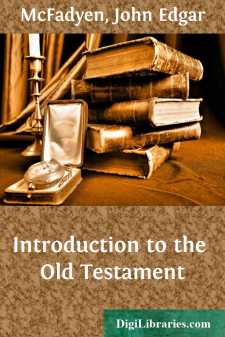Categories
- Antiques & Collectibles 13
- Architecture 36
- Art 48
- Bibles 22
- Biography & Autobiography 813
- Body, Mind & Spirit 141
- Business & Economics 28
- Children's Books 12
- Children's Fiction 9
- Computers 4
- Cooking 94
- Crafts & Hobbies 4
- Drama 346
- Education 46
- Family & Relationships 57
- Fiction 11826
- Games 19
- Gardening 17
- Health & Fitness 34
- History 1377
- House & Home 1
- Humor 147
- Juvenile Fiction 1873
- Juvenile Nonfiction 202
- Language Arts & Disciplines 88
- Law 16
- Literary Collections 686
- Literary Criticism 179
- Mathematics 13
- Medical 41
- Music 40
- Nature 179
- Non-Classifiable 1768
- Performing Arts 7
- Periodicals 1453
- Philosophy 64
- Photography 2
- Poetry 896
- Political Science 203
- Psychology 42
- Reference 154
- Religion 513
- Science 126
- Self-Help 83
- Social Science 81
- Sports & Recreation 34
- Study Aids 3
- Technology & Engineering 59
- Transportation 23
- Travel 463
- True Crime 29
Introduction to the Old Testament
Description:
Excerpt
THE ORDER OF THE BOOKS
In the English Bible the books of the Old Testament are arranged, not in the order in which they appear in the Hebrew Bible, but in that assigned to them by the Greek translation. In this translation the various books are grouped according to their contents—first the historical books, then the poetic, and lastly the prophetic. This order has its advantages, but it obscures many important facts of which the Hebrew order preserves a reminiscence. The Hebrew Bible has also three divisions, known respectively as the Law, the Prophets, and the Writings. The Law stands for the Pentateuch. The Prophets are subdivided into (i) the former prophets, that is, the historical books of Joshua, Judges, Samuel and Kings, regarded as four in number; and (ii) the latter prophets, that is, the prophets proper—Isaiah, Jeremiah, Ezekiel, and the Twelve (i.e. the Minor Prophets). The Writings designate all the rest of the books, usually in the following order—Psalms, Proverbs, Job, Song of Songs, Ruth, Lamentations, Ecclesiastes, Esther, Daniel, Ezra-Nehemiah, Chronicles.
It would somewhat simplify the scientific study even of the English Bible, if the Hebrew order could be restored, for it is in many ways instructive and important. It reveals the unique and separate importance of the Pentateuch; it suggests that the historical books from Joshua to Kings are to be regarded not only as histories, but rather as the illustration of prophetic principles; it raises a high probability that Ruth ought not to be taken with Judges, nor Lamentations with Jeremiah, nor Daniel with the prophets. It can be proved that the order of the divisions represents the order in which they respectively attained canonical importance—the law before 400 B.C., the prophets about 200 B.C., the writings about 100 B.C.—and, generally speaking, the latest books are in the last division. Thus we are led to suspect a relatively late origin for the Song and Ecclesiastes, and Chronicles, being late, will not be so important a historical authority as Kings. The facts suggested by the Hebrew order and confirmed by a study of the literature are sufficient to justify the adoption of that order in preference to that of the English Bible.
The Old Testament opens very impressively. In measured and dignified language it introduces the story of Israel's origin and settlement upon the land of Canaan (Gen.—Josh.) by the story of creation, i.-ii. 4_a_, and thus suggests, at the very beginning, the far-reaching purpose and the world-wide significance of the people and religion of Israel. The narrative has not travelled far till it becomes apparent that its dominant interests are to be religious and moral; for, after a pictorial sketch of man's place and task in the world, and of his need of woman's companionship, ii. 4_b_-25, it plunges at once into an account, wonderful alike in its poetic power and its psychological insight, of the tragic and costly[1] disobedience by which the divine purpose for man was at least temporarily frustrated (iii.)....


